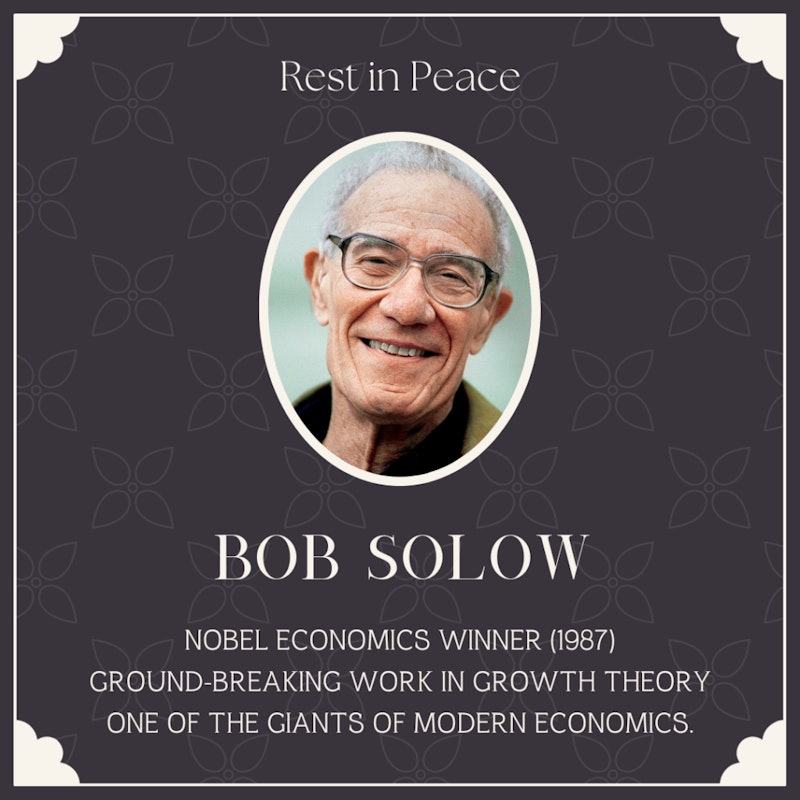In the News
Robert Solow: Ninety-Nine Years of Economic Wisdom

22nd December 2023
A towering giant of modern Economics, Professor Bob Solow, has passed away at the age of 99. I was taught the Solow Model as a student at Cambridge and I have continued to teach and refer to it regularly throughout a full-time teaching career that spanned five decades. There will be numerous references to his momentous life and work on social media in the days and weeks ahead and I will try to gather together as many as I can on this blog.

I have lost my mentor. Robert Solow was my thesis advisor, and being named the Robert Solow professor of economics at MIT was the proudest day of my life. There will be times for elogies. Meanwhile, RIP Bob, with infinite thanks.
— Olivier Blanchard (@ojblanchard1) December 22, 2023
Robert (Bob) Solow was a towering figure in the field of economics and will be remembered for his profound contributions to the discipline.
— Jadrian Wooten (@Wootenomics) December 22, 2023
Here are 2 of his most significant contributions: pic.twitter.com/lGFtnEUdVg
Really sorry to hear of the death of Bob #Solow, aged 99 https://t.co/3ucEnYwKNk I knew him as an @MITEcon colleague: he was brilliant, generous, insightful & a deeply sensible economist. I teach and discuss his work just about every week. Farewell.
— John Van Reenen (@johnvanreenen) December 22, 2023
Bob Solow, RIP https://t.co/mKGy7uvQ1e
— Marginal Revolution (@MargRev) December 22, 2023
Robert M. Solow, a groundbreaking economist and Nobel laureate, was a professor at the Massachusetts Institute of Technology (MIT) for over 60 years. He is best known for his groundbreaking work on the role of technological progress in economic growth. Solow's research established that technological progress is the main determinant of economic growth, not just capital and labor. His work has shaped modern economic thought and influenced generations of economists. He was also a highly respected teacher, known for his legendary lectures that inspired countless MIT students. Solow's contributions to economics will continue to be felt for years to come, and his legacy as a pathbreaking scholar and educator will be remembered for generations.
Bob Solow's Scholarly Contributions in Economics: A Succinct Overview
Landmark Contribution:
- Neoclassical Growth Model: Solow's 1956 paper, "A Contribution to the Theory of Economic Growth," established the foundational framework for modern growth theory. This model analyzes how factors like labor, capital, and technological progress interact to drive long-term economic growth.
Key Insights:
- Role of Technological Progress: Solow demonstrated that technological progress, not just capital accumulation, is crucial for sustaining economic growth. This insight challenged older theories and shifted the focus towards understanding innovation and knowledge creation.
- Measurement of Productivity: Solow's residual analysis helped quantify the contribution of technological progress to economic growth. This methodology continues to be a critical tool for economists studying growth patterns.
- Convergence Hypothesis: Solow's model implies that economies with lower capital per worker initially will grow faster than those with higher levels, potentially leading to convergence in living standards over time. This notion has sparked ongoing debate about growth dynamics and policy implications.
Additional Contributions:
- Theory of Capital: Solow's work on capital depreciation and optimal investment strategies refined understanding of how economies accumulate and utilize capital.
- Phillips Curve: Solow contributed to the development of the Phillips curve, exploring the trade-off between inflation and unemployment.
- Growth with Different Capital Vintages: He introduced models distinguishing between "new" and "old" capital,acknowledging the increasing efficiency of newer technologies.
- Climate Change Economics: Solow later focused on environmental issues, exploring the economic dimensions of climate change and sustainable growth.
Impact:
- Solow's work earned him the Nobel Prize in Economics in 1987.
- His models remain foundational tools for research on economic growth, technological progress, and policy evaluation.
- His insights sparked further theoretical development and empirical investigations in numerous areas of economics.
In short, Bob Solow's contributions revolutionized our understanding of economic growth, technological progress, and capital accumulation. His work continues to shape economics research and policy debates to this day.
You might also like

We are much better off than the official statistics say
16th March 2016
4.2.6.5 Economic Growth and Development (AQA A-Level Economics Teaching PowerPoint)
Teaching PowerPoints
The Harrod-Domar Growth Model
Study Notes
IB Economics - Understanding Economic Growth
Study Notes